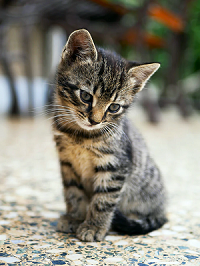Love doesn’t equal unlimited amounts of food. It’s better to keep your cat lean and healthy. Here’s how.
Obesity is recognized as a serious health concern among Americans today, putting more and more of us at risk for chronic illnesses and earlier mortality. Unfortunately, the unhealthy eating habits of many Americans often extend to their pets as well.
Dr. Joe Bartges, professor of medicine and nutrition with the University of Tennessee College of Veterinary Medicine, summarizes the health risks in cats. “At a cellular and metabolic level and in very simple terms, obesity puts a strain on the system, which may result in disease. Additionally, obesity is associated with greater body weight and is an extra load that needs to be carried.”
A Cornell College of Veterinary Medicine follow-up to a 2,000-plus cat feline obesity study showed several serious effects:
- Overweight cats, including those considered “heavy” and “obese,” are four-and-a-half times more likely to develop diabetes mellitus, compared to optimal weight cats.
- Obese cats are seven times more likely to require veterinary care for lameness, caused by joint diseases such as arthritis or muscle injuries, compared to optimal weight cats. Heavy cats are three times more likely to suffer lameness.
- Obese cats are three times more likely to be presented to veterinarians for non-allergic skin conditions, probably because the cats cannot reach all parts of their bodies to groom themselves properly.
- Obese cats are twice as likely to die in middle age, which for cats is six to 12 years.



